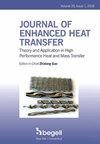几何参数对内部螺旋肋形管热液压性能的影响
IF 1.5
4区 工程技术
Q3 ENGINEERING, MECHANICAL
引用次数: 0
摘要
本文对 11 根内槽管进行了流动和传热实验。制冷剂在管外沸腾或冷凝。实验管的内螺旋肋高度为 0.25-0.36 毫米,螺旋角为 40-60°,肋底厚度为 0.40-0.79 毫米,肋尖厚度为 0.078-0.283 毫米,Ns(每圈圆周微鳍数)为 40-50。与光滑管相比,摩擦系数大约高出 1.8 至 3.3 倍。分析肋条几何形状对流动和传热的影响时发现,内肋条高度越高,管内对流传热的增强效果越好。肋条顶端和底部的厚度越大,对管内的摩擦系数越不利。当螺旋角从 45°增加到 50°时,对传热性能的影响并不明显。对于 Ns 的增加,考虑到压力损失的增加,本研究中每圈 45 根肋条似乎是最佳值。还对 11 个管道的热液压性能进行了评估。结果表明,1 号管在冷凝管中性能最佳,7 号管在沸腾管中性能最佳。本文章由计算机程序翻译,如有差异,请以英文原文为准。
Effect of Geometrical Parameters on the Thermal-Hydraulic Performance of Internal Helically Ribbed Tubes
The flow and heat transfer experiments are conducted in this paper for eleven internally grooved tubes. Refrigerants are boiling or condensing outside the tube. The experimental tubes have the internal helical rib heights of 0.25-0.36 mm, helix angles of 40-60°, rib base thicknesses of 0.40-0.79 mm, rib tip thicknesses of 0.078-0.283 mm, and Ns (Number of circumferential micro-fins per circle) of 40-50.It shows that the heat transfer enhanced ratios is usually ranging from 2.3-3.64. The friction factor relative to the smooth tube are about 1.8 to 3.3 times higher. Analyzing the effect of rib geometry on flow and heat transfer, it was found that the higher the height of the internal rib, the better the enhancement of convective heat transfer in the tube. The greater the thickness of the rib tip and base, the more detrimental to the friction factor in the tube. It had not noticeable influence on the heat transfer performance as the helix angle increases from 45° to 50°. For the increase of Ns, it appears that 45 ribs per circle is the best value in the present study when considering the increase in pressure loss. The thermal-hydraulic performance of eleven tubes were also evaluated. It shows that Tube-1 had the best performance in the condensing tubes and Tube-7 had the best performance in the boiling tubes.
求助全文
通过发布文献求助,成功后即可免费获取论文全文。
去求助
来源期刊

Journal of Enhanced Heat Transfer
工程技术-工程:机械
CiteScore
3.60
自引率
8.70%
发文量
51
审稿时长
12 months
期刊介绍:
The Journal of Enhanced Heat Transfer will consider a wide range of scholarly papers related to the subject of "enhanced heat and mass transfer" in natural and forced convection of liquids and gases, boiling, condensation, radiative heat transfer.
Areas of interest include:
■Specially configured surface geometries, electric or magnetic fields, and fluid additives - all aimed at enhancing heat transfer rates. Papers may include theoretical modeling, experimental techniques, experimental data, and/or application of enhanced heat transfer technology.
■The general topic of "high performance" heat transfer concepts or systems is also encouraged.
 求助内容:
求助内容: 应助结果提醒方式:
应助结果提醒方式:


